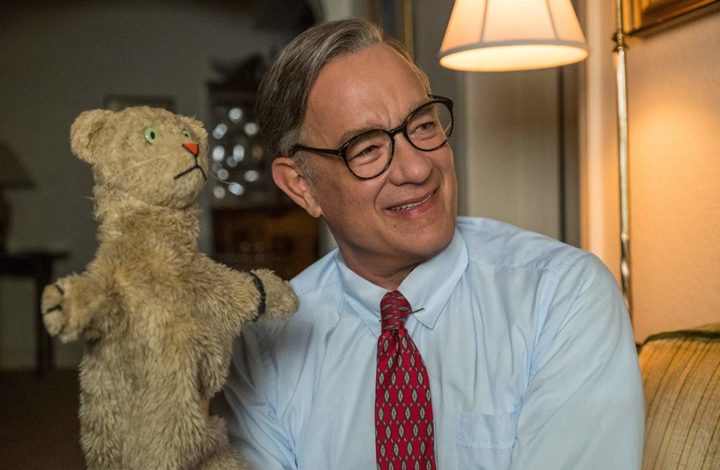
MPAA Rating: PG | Rating: ★★★★
Release year: 2019
Genre: Biography, Drama Director: Marielle Heller
What do you do with the mad that you feel?
It’s a simple question Fred Rogers would sing on his classic television show for children, Mister Rogers’ Neighborhood. The song is a bit corny, outdated in some ways, and perhaps a bit simplistic and sentimental. Like Rogers’ entire ethos, it just shouldn’t work in our modern fast-paced cynical era—we’re too smart for this, and the world is far too complex and broken for us to simply “stop stop stop” when we feel angry. I mean, there’s so much to be angry about! And yet the song (and Rogers’ whole demeanor) not only works, but it’s profoundly affecting, even transcendent. Rogers is a beautiful peculiarity in his genuine care and concern for other human beings.
Likewise, there are so many things about A Beautiful Day in the Neighborhood that shouldn’t work for us—sentimentality, fantasy sequences, Tom Hanks as Rogers—that absolutely *do* work, precisely due to Marielle Heller’s empathetic and subtle direction. Like Fred Rogers himself, the film is disarming and subversive in its optimism and hope. Where the excellent 2018 documentary Won’t You Be My Neighbor? gave an in-depth focused biography of Rogers’ life and work, this fictional drama based on a true story puts Rogers in a supporting, yet significant, role from one particular period of his life.
Inspired by the real-life relationship between journalist Tom Junod and Rogers, A Beautiful Day in the Neighborhood focuses more on the Junod character—here he’s named Lloyd Vogel (Matthew Rhys)—and how his encounters with Rogers transformed his jaded outlook on his relationship with his father (Chris Cooper) as well as the human condition as a whole. Opening with Hanks-as-Rogers speaking directly to the camera as if we were watching an episode of the Mister Rogers TV show, the film uses its “odd couple” trope effectively, contrasting Vogel’s darkly cynical view and his emotional repression with Rogers’ calm and almost other-worldly love for others. A new father himself, Vogel’s relationship with his father and his own wife, Andrea (Susan Kelechi Watson) become increasingly strained as the film progresses.
Hanks’ performance as Rogers works not because there is some sort of strong physical resemblance between the two men—indeed, I found it hard to forget that it was Tom Hanks on the screen—but because Hanks wisely allows the compassionate spirit of Rogers shine through. It’s not mimicry or hagiography, but rather an honorific and humble performance. Rhys is capable as the skeptical Lloyd, and Cooper surprised me with how he takes what could have been a farcical performance and turns it into something more complex and with emotional gravitas. Yet more than anything, I was impressed by the Heller’s keen direction. Even as you can guess where the narrative is headed, Heller makes choices in the framing and camera movements which keep things simple and straightforward, yet are also willing to blur the lines between realism and expressionism. A lengthy fantasy/dream sequence where Vogel finds himself as a character on Rogers’ show—he even sports giant rabbit ears for a scene while talking with Daniel Striped Tiger—could be seen as mawkish or off-putting. Yet it strangely isn’t; instead, it’s a striking portrayal of a broken individual wrestling with his past traumas and the pain of forgiveness. When Vogel-as-Rabbit says “I’m sad” aloud, the words hit like a freight train (or a trolley car).
One of the most significant scenes occurs in a restaurant when Rogers asks Vogel to simply sit in silence for a minute and remember all the people who have shown him love. So they do—and so do we as the audience. The film essentially stops and invites us to recall along with Rogers, who subtly and suddenly breaks the fourth wall not with his words, but with his compassionate, tear-filled eyes. And that’s when I realized that my own eyes were wet with tears as I was confronted with both the mad that I personally feel, as well as the deep recollection of those who have loved me well, and whom I love in return. To sit in peaceful silence, to remember the good we’ve encountered, to sing simple songs of joy and thanksgiving, to eat with friends and family, to forgive, to pray—these are the practices which make Rogers’ neighborhood (and our own world) so beautiful.
IMDB Listing: https://www.imdb.com/title/tt3224458/
Such a wonderful film – the scene you describe in the final paragraph is one of the best things I’ve seen at the movies this year.